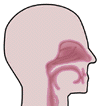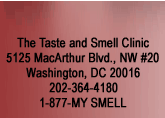  |
||
 |
April 2014Smell and taste dysfunction after traumatic brain injuryThere is a hidden epidemic of smell and taste dysfunction in the United States following traumatic brain injuries (TBI). While this epidemic is well known to the patients who suffer with TBI most medical professionals are unfamiliar with its presence, common occurrence or social or emotional consequences. There are over 1.2 million yearly serious head injuries in the United States. Of these injuries about 50% of patients exhibit some aspect of smell and/or taste dysfunction – experiencing loss of smell or taste acuity and/or presence of smell or taste distortions. Loss of smell or taste acuity relates to patients being unable to taste foods or smell external odors. This results in loss of appetite, weight changes and changes in life style with decreased interest in eating or social events associated with eating. Patients may eat spoiled food, be exposed to unseen fires or be unable to smell smoke. Presence of smell or taste distortions can be even more devastating. Horrible odors may appear in the nose without external smells (phantosmia), rotten tastes may appear in the mouth without any food (phantageusia), pleasant odors (e.g., perfume, coffee) may smell rancid (aliosmia) or pleasant tastes (e.g., chocolate, candy) may taste disgusting (aliageusia). It is commonly thought that following a TBI the olfactory nerves are severed and that nothing can be done to correct these symptoms. This is not true. Patients may try to explain these problems to their physician and while they may be caring doctors they may be unaware of the large number of patients with these problems, the extent with which these symptoms interfere with their daily lives and the fact that there is effective treatment for these problems. We have established a specific program at The Taste and Smell Clinic in Washington, DC to help these patients. We are able to identify this problem and based upon this identification we are able to correct these symptoms. We have dealt with patients with TBI for over 40 years. We have developed biochemical tools to evaluate the pathology which causes these symptoms. We have developed treatment based upon their biochemical pathology to correct these symptoms. In so doing we have helped many patients to regain their smell and taste acuity and to eliminate their smell and taste distortions. I discussed these problems at the annual meeting of the Brain Injury Association of Maryland on March 20, 2014. This meeting was attended by many medical caregivers whose task is to help patients with TBI regain their normal lives. The Taste and Smell Clinic is ready to help these caregivers and their patients regain their normal smell and taste function. Recent publications in the peer-reviewed medical literature will also help you understand both the pathology and treatment of this condition.
|
|